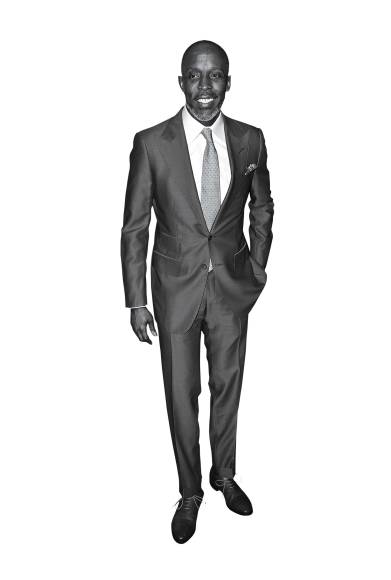What interested you about The Night Of?
I'm just a loyal f-cker for good writing. Everything that I've been on on HBO I've had to audition for: Bessie, The Night Of, Boardwalk Empire, The Wire. The caliber of writers I got to work with early on in my career—David Simon—that kind of just sets the tone for your appetite.
The show deals with bias against black Americans and Muslim Americans. What effect do you think the show will have on the conversation about race?
In my perspective, the show has very little to do with race, and everything to do with class. I've come to realize that the race thing is a smoke screen. The real war is a war on class. It's about how much green you have in your pocket. In this country, you can unfortunately literally get away with murder if you have enough political background behind you. You are innocent until proven poor.
You've also addressed the failures of the system on your Viceland show Black Market. How did that show come to be?
I got a phone call from Spike Jonze. When I get there, he and his team were talking to me like I was this übersmart person, and I was just smiling and nodding my head and freaking out on the inside. But once someone in the room said, "Black Market to us means when the system fails you, you create your own system," a lightbulb went off in my head. I was just like, Oh, I get it now. I thought about my mom. I'm first-generation Bahamian, and at my dinner table it was a big deal when you got your green card. And we did whatever we had to do to get our green card.
What have been the most personally affecting stories?
One young man was wearing a mask during the interview. After we shut the cameras down, he takes his mask off, and this 23-year-old boy looks at me and says, "Yo, Omar, take me with you, man. I'm tired of this. I don't want to die out here in these streets." Six months later, sure enough, he died on those streets. One afternoon, him and his grandmother got shot up.
On the first episode of Black Market, you mention that when you were on The Wire, the lines blurred between your life and Omar's. Could you explain?
The Wire was my breakout. And I'm beginning now to finally deal with what is a self-esteem issue. Growing up, I got picked on a lot. I was the corny one. I was not popular with the ladies. In a very alpha-male community, being sensitive is not considered a quality. Omar became an alter ego. A gay man who doesn't like fancy clothes or fancy cars, doesn't do drugs, doesn't even curse and robs the most gangster drug dealers in the community. He's an outcast, and I identified with that immensely. Instead of using it as a tool to maybe heal myself, I hid behind that. Nobody was calling Michael in the streets. Everything was Omar, Omar, Omar. I mistook that admiration. It felt good. But it wasn't for me. It was for a fictional character. When that show ended, along with that character, I was clueless about how to deal with that. I crumbled.
You've said that the identity crisis led you to experiment with cocaine.
The darkness that was on him, I wore. I dressed like him, walked like him, blew all this money. I was back in the projects by Season 2.
What pulled you out of that?
A lot of prayer. The reckless behavior had to stop--for my kids, for my family.
Projects obviously change you personally. Do you hope your work on Black Market imparts any political message?
It would be my desire to help heal my community to stop all the bloodshed. When I say bloodshed, I don't just mean, "Oh, the white cop killed the black kid." I also mean for the 10 black lives that are taken by 10 black hands. How can my country better equip me and my brothers and sisters to stop our kids from hurting and bleeding and dying on the streets? If Black Market can do that, that would be the best thing I could ask for.


